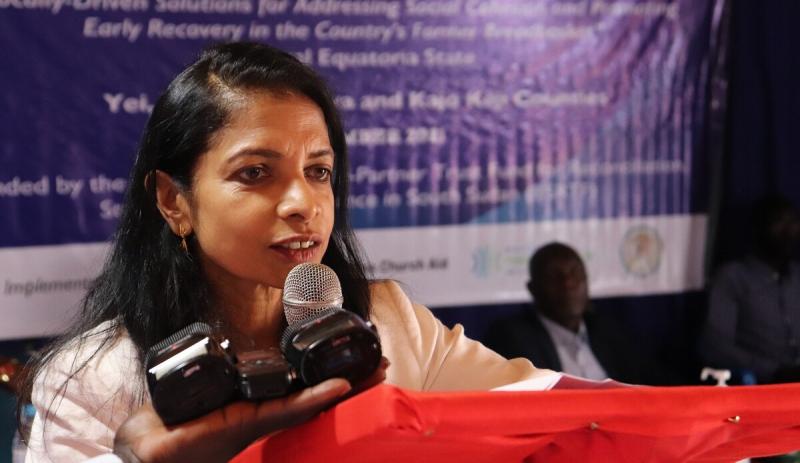

An innovative new programme to promote social cohesion between politically divided communities and to pave the way for recovery across the region is designed to help communities in Yei, Lainya, Morobo and Kajo-Keji reconcile and end violence and create new incentives to sustain peaceful coexistence. It is funded by donations from the governments of Norway, Germany, Sweden, the Netherlands and Canada through the UN Multi-Partner Trust Fund for Reconciliation, Stabilization, and Resilience in South Sudan (RSRTF), a joint initiative by UNMISS and the UN Country Team.
CENTRAL EQUATORIA - “Local solutions are the best solutions. The problems in South Sudan are ours and we have the ability and capacity to solve them and take this country forward.”
Yei River County Commissioner, Aggrey Cyrus Kanyi, is a passionate advocate for grassroots-driven solutions to the myriad of complex problems confronting communities in the southern part of Central Equatoria.
His call to take ownership of the peace and recovery process was echoed by many other stakeholders at the launch of an innovative new programme to promote social cohesion between politically divided communities and to pave the way for recovery across the region.
The programme is designed to help communities in Yei, Lainya, Morobo and Kajo-Keji reconcile and end violence, bring stability to where they live, and create new incentives to sustain peaceful coexistence.
It is funded by generous donations from the governments of Norway, Germany, Sweden, the Netherlands and Canada through the UN Multi-Partner Trust Fund for Reconciliation, Stabilization, and Resilience in South Sudan (RSRTF), a joint initiative of the UN Mission in South Sudan and the UN Country Team.
More than 50 government, religious, civil society, UN, and Non-Governmental Organization representatives came together in Yei for the official launch.
“The programme will work hand in glove with local authorities and communities, particularly youth, women, and displaced families returning to the area,” said Geetha Pious, the Head of the UNMISS Field Office in Central Equatoria State. “UNMISS recognizes the importance of a bottom-up approach and stands ready to support all partners to bring peace and revive the country’s former breadbasket.”
Authorities at the national and local level welcomed the initiative and spoke strongly in support of its approach.
“It’s important that we make use of our political and ethnic diversity for peace. It is also very timely to talk about locally driven solutions for peacebuilding,” said the National Minister of Peacebuilding, Stephen Par Kuol. “If we fix Greater Yei, we will fix South Sudan.”
“I am optimistic about this programme because this programme is ours,” echoed Sarah Nene Redento, Deputy Governor of Central Equatoria State.
There was also a recognition among local authorities such as Morobo County Commissioner, James Mawa John, that: “without security, there can be no development”.
While the programme is focused on supporting communities to resolve local conflicts, it also seeks to strengthen the rule of law and amplify the voices of the youth and women in political decision-making processes.
“Youth are the majority,” said Clement Bennett, a youth representative from Yei. “If we empower them, this nation will change. Together we will make this country great again.”
The International Organization for Migration (IOM) is leading the programme with support from UNMISS, the Community Empowerment for Progress Organization (CEPO), Support for Peace and Education Development Programme (SPEDP), Finn Church Aid (FCA), and the Whitaker Peace and Development Initiative (WPDI).
IOM Transition and Recovery Unit Coordinator, Benjamin Moore, explained that the Fund emphasizes the “primacy of politics” and “continuous political dialogue” which are key to securing reconciliation, peace, stabilization and development.
This new initiative in southern Central Equatoria State is the fourth area-based programme funded by the RSRTF. The RSRTF’s goals are to contribute to the stabilization of conflict hotspots in South Sudan and to help pave the way for recovery and resilience.